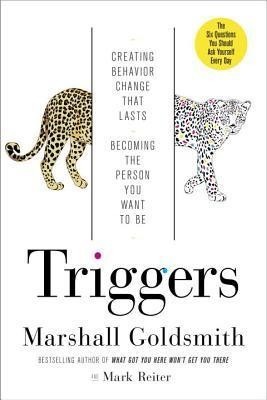There are no items in your cart
Add More
Add More
| Item Details | Price | ||
|---|---|---|---|

The key takeaways from my book "Triggers" are centered around the concept that our environment constantly shapes our behavior, often without our conscious awareness.
Here are some of the main points:
Recognizing Triggers: Triggers, whether internal or external, profoundly impact our behavior. Recognizing and understanding these triggers is vital for personal growth and behavior change.
Self-Awareness: Increasing self-awareness enables us to recognize when we're being triggered and empowers us to make conscious choices in our responses.
Response Control: Armed with awareness of our triggers, we can exert greater control over our responses. This empowers us to align our actions with our goals and values, rather than reacting impulsively.
Challenges of Behavioral Change: Goldsmith highlights the difficulty of meaningful and lasting behavioral change, emphasizing the need for structural support and strategies beyond mere willpower. Goldsmith highlights the importance of persistence and resilience in the face of setbacks, as well as the need for realistic expectations when embarking on behavior change journeys.
Belief Triggers: Certain beliefs can hinder change efforts by undermining our confidence or rationalizing undesired behavior. Recognizing and addressing these beliefs is crucial for progress.
Role of the Environment: Our environment shapes our behavior in significant ways. Designing environments that support our goals and minimize triggers for unwanted behaviors is essential for success.
Creating Structure: Implementing structure in our lives helps manage triggers and reduce decision fatigue, facilitating consistency in behavior change efforts.
Active Engagement: Rather than passively reacting to our environment, actively engaging with it allows us to influence our behavior positively.
Anticipating and Adjusting to Triggers: Developing the ability to anticipate triggers and adjust our responses accordingly is key to maintaining progress and integrity in behavior change efforts.
Daily Effort and Discipline: Consistent effort and discipline are required for sustained behavior change. The concept of asking daily questions helps reinforce this discipline and track progress.
Feedback and Accountability: Seeking feedback and holding ourselves accountable are essential components of the change process, providing valuable insights and reinforcement.
Seeking Support: Sharing challenges and seeking support from trusted individuals can provide additional perspectives and encouragement in managing triggers effectively.
What have I started doing differently since I read the book?
At the end of each day I now ask myself “Have I done my best to <key goals for the day / week / month / year>?” This powerful questioning has made me aware of some of my triggers, and thereby change the response.
What are you taking away from this read?

Shanti Sharma